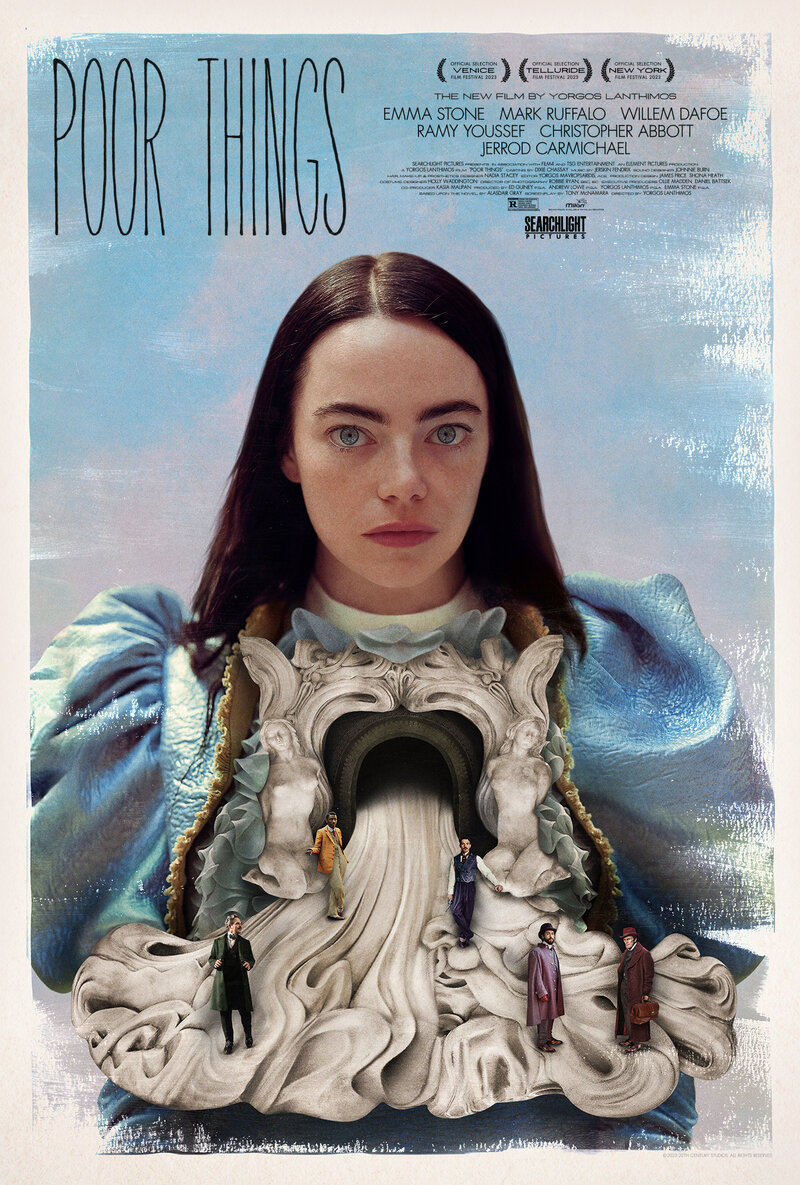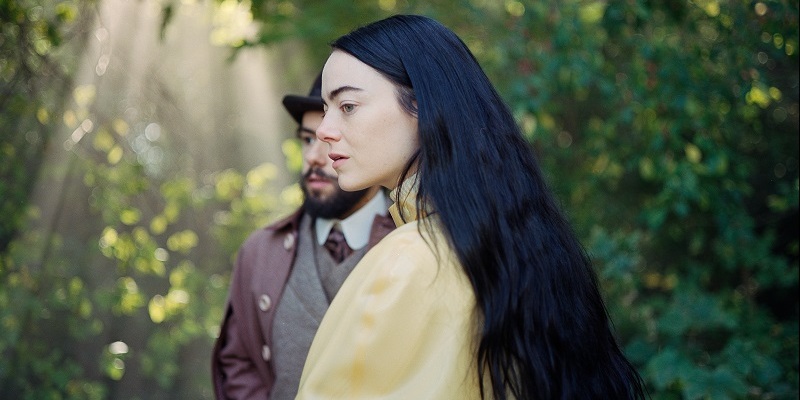
Review by
Eric Hillis
Directed by: Yorgos Lanthimos
Starring: Emma Stone, Mark Ruffalo, Willem Dafoe, Ramy Youssef, Jerrod Carmichael, Christopher Abbott, Margaret Qualley,
Kathryn Hunter

If at the start of 2023 you had told me the latest film from Greek
arthouse icon Yorgos Lanthimos would share a remarkably similar
narrative with a blockbuster based on a popular children's toy, I'd have
declared you mad and bid you good day good sir. Yet both Lanthimos's
Poor Things and Greta Gerwig's
Barbie
are essentially feminised reworkings of Pinocchio, with women created by
men setting out to discover themselves. Of the two movies,
Poor Things is by far the more successful, features the
more striking lead performance, and is certainly the funniest.
Lanthimos's brand of absurdism has thus far been rooted in identifiably
real world settings, be it the suburbs of Dogtooth and
The Killing of a Sacred Deer
or his reimagining of the court of Queen Anne in his period comedy
The Favourite. Poor Things drops us into a fantastical steampunk Victorian London, one with
a heavy Terry Gilliam influence in its production design. Lanthimos
borrows Gilliam's propensity to deploy fish eye lenses, which I've
always found intensely irritating. I've long suffered an aversion to the
stylings of Gilliam and similar filmmakers like Tim Burton and
Jean-Piere Jeunet, the sort of filmmakers who make movies with titles
like "Doctor Merriweather's Haberdasherie of Confounding Contraptions."
Some of the visuals of Poor Things made me break out in
hives as they reminded me so much of Gilliam, but there was enough of
Lanthimos's humour to get me through.

The early scenes are shot in black and white and owe a debt to David
Lynch's Eraserhead and
The Elephant Man. It's here that we find Dr. Godwin Baxter (Willem Dafoe), a
classic mad scientist with a stitched together face, the result of a
childhood spent serving as a guinea pig for his equally mad scientist
father. There's method to Godwin's madness though, as he's managed to
create life in the form of Bella (Emma Stone), a suicide victim
he brought back to life after discovering her body floating in the
Thames. Godwin assigns one of his protégés, Max McCandles (Ramy Youssef), the task of observing Bella and noting her intellectual development.
In the course of his assignment Max falls in love with the woman-child
and asks for her hand in marriage.
Max's plans are disrupted by the arrival of Duncan Wedderburn (Mark Ruffalo), a moustachioed bounder who sweeps Bella off her feet and takes her
on a whirlwind tour of Europe. It's at this point that the film switches
to colour and begins to ape the sort of plotline you might find in a
'70s Emmanuelle movie. Bella's development sees her
discover the joy of sex ("Why don’t people do this all the time?" she
asks a drained Duncan), which leads Duncan to grow jealous as she seeks
fulfilment wherever she can find it, even taking a job at a Parisian
brothel. The Laura Gemser Emanuelle movies always featured
a scene in which the titular bed-hopper was exposed to some awful aspect
of humanity at its worst, and we get that here when Bella stumbles
across the digging of a mass grave for infants in Alexandria.

Bella doesn't just develop her sexuality, but also a conscience and
intellectual curiosity. This rankles with the men in her life, who were
quite happy when she was a barely formed object they could more readily
manipulate. Christopher Abbott pops up as a sinister former lover
late on, and it's the latest in a line of roles in which Abbott plays a
misogynist who gets his comeuppance at the hands of a woman.
While some of the visual stylings of Poor Things feel
gimmicky, in particular the distracting fish-eye lens and peephole
effects, there are some striking images. Lanthimos marks his film's
chapters with insanely gorgeous tableaus of the sort found in recent
Lars von Trier films. Some of the movie's best colour shots wouldn't be
out of place in a Michael Powell movie. There are inventive treats like
a horse-drawn carriage which is revealed as a steam-powered contraption
with a fake horse's head stuck on the front.

For all the lavish excess of its cinematography, score, production and
costume design, Poor Things is anchored by a remarkable
lead turn from Stone. We're told Bella develops intellectually at a rate
of learning 15 new words a day, and Stone fully sells this idea. At the
beginning of the movie we find her acting like a feral cat that's been
let indoors for the first time, her legs moving with the awkwardness of
a toddler learning to walk upright, and she gradually dials down her
performance as she begins to more closely resemble an adult. Some of the
actress's best work comes in the later stages when we can almost see her
brain throbbing as Bella is consumed by intellectual ideas, fascinated
by every new detail she learns of the world.
Save for The Favourite, I've enjoyed every Lanthimos offering to date but they all have a
certain point where they lag, and Poor Things is no
different. Bella's trip around Europe perhaps takes one stop too many,
and I tired of Ruffalo's initially amusing Leslie Phillips impersonation
by the halfway point. But if you're a fan of the Greek filmmaker's wry
absurdist humour you'll find your ribs sufficiently tickled by this
takedown of male insecurity.

Poor Things is on UK/ROI VOD from February 27th.

